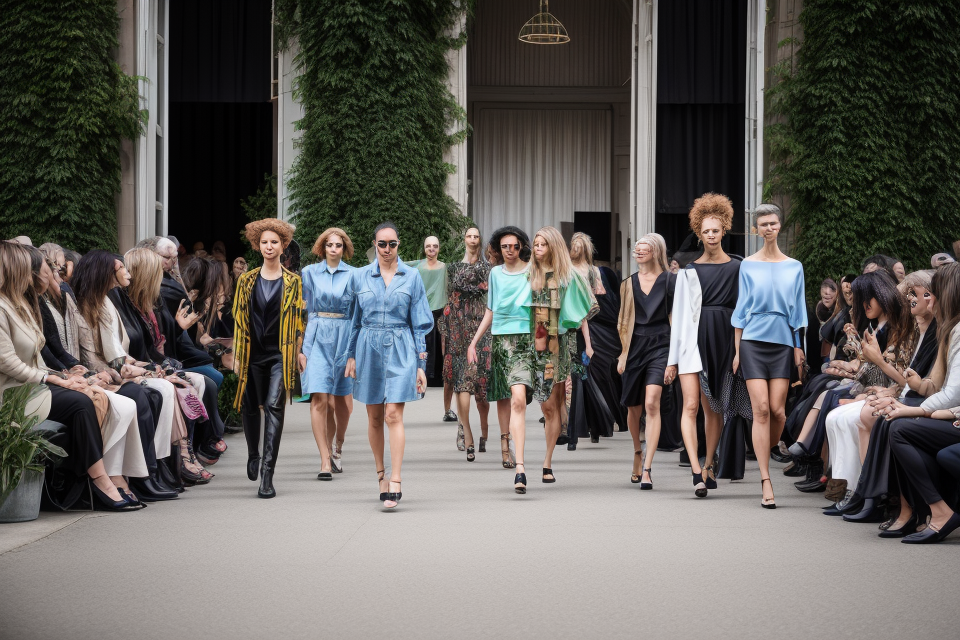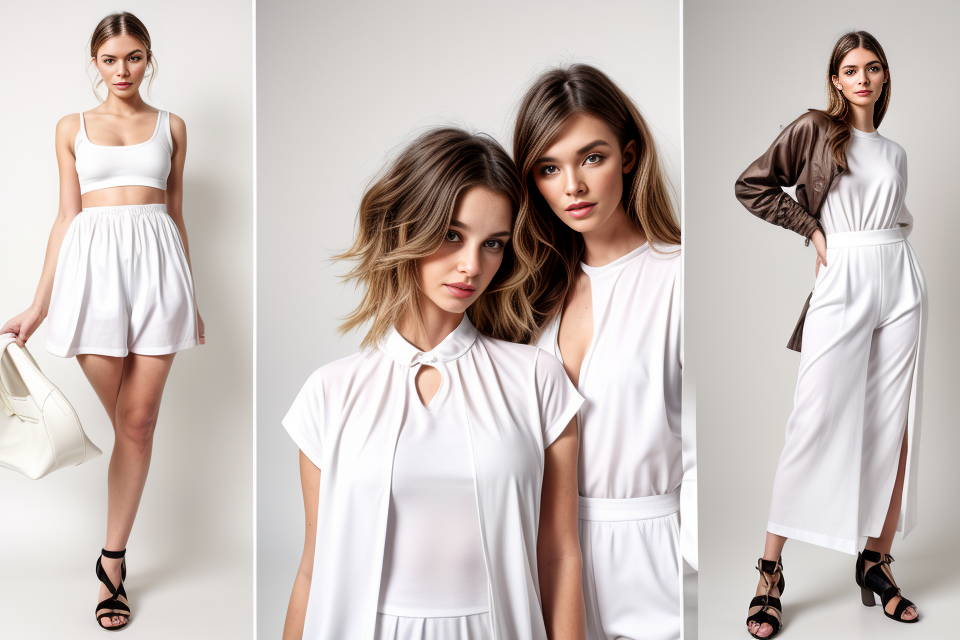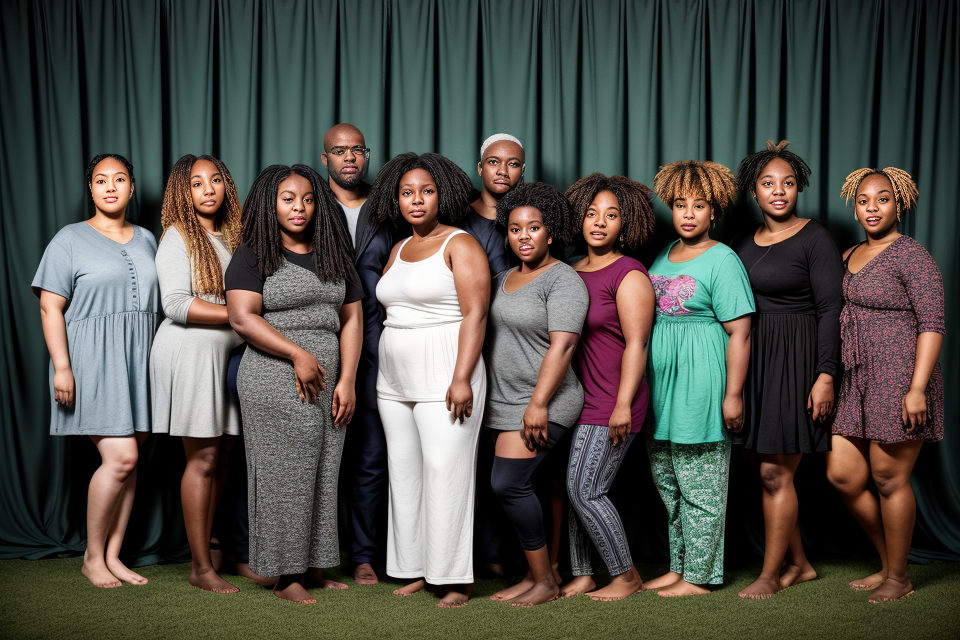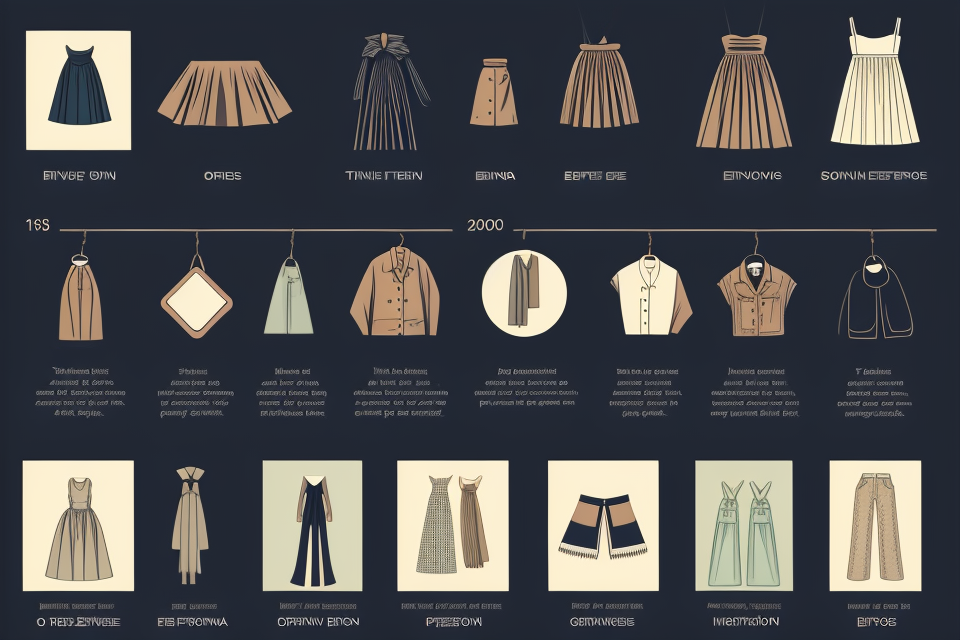The fashion industry has been one of the biggest contributors to the global pollution and waste crisis. However, in recent years, there has been a growing awareness and movement towards sustainability in the fashion industry. This has led to the emergence of leaders who are pushing for change and implementing sustainable practices in their businesses. In this article, we will explore who these leaders are and what they are doing to promote sustainability in the fashion industry. From innovative materials to ethical labor practices, these leaders are shaping the future of fashion and inspiring others to follow in their footsteps. So, let’s dive in and find out who is leading the charge towards a more sustainable future in fashion.
The fashion industry has seen a growing interest in sustainability in recent years, with many brands and leaders working towards more environmentally and socially responsible practices. Some of the leaders in sustainability in the fashion industry include companies like Patagonia, Eileen Fisher, and The North Face, which have been recognized for their commitment to sustainable materials, fair labor practices, and reducing waste. Additionally, individuals such as Stella McCartney, Livia Firth, and Emma Watson have used their platforms to raise awareness about sustainability in fashion and advocate for change within the industry.
The Importance of Sustainability in Fashion
The Environmental Impact of Fast Fashion
Water Pollution
Fast fashion has a significant impact on the environment, particularly in terms of water pollution. The production of textiles requires large amounts of water, and the dyeing and treatment processes can release harmful chemicals into the water supply. For example, it takes approximately 2,700 liters of water to produce a single cotton t-shirt, and the textile industry is responsible for 20% of global water pollution.
Greenhouse Gas Emissions
Fast fashion also contributes to greenhouse gas emissions, which contribute to climate change. The production of textiles requires large amounts of energy, and the transportation of raw materials and finished products contributes to carbon emissions. Additionally, the use of synthetic fibers, such as polyester, contributes to greenhouse gas emissions as they are not biodegradable.
Textile Waste
Fast fashion also contributes to textile waste, which has a significant environmental impact. The production of new textiles requires large amounts of resources, and the disposal of old or unwanted clothing contributes to landfill waste. Additionally, the use of cheap materials and poor production techniques can result in clothing that is not durable, leading to more frequent replacement and waste.
Overall, the environmental impact of fast fashion is significant and requires attention from leaders in the fashion industry.
The Social Impact of Fast Fashion
Labor Exploitation
Fast fashion has been criticized for its labor exploitation, with many garment workers being paid poverty wages and working in poor conditions. Many of these workers are women, and they often face discrimination and harassment in the workplace.
Unfair Wages
Fast fashion companies have also been accused of paying their workers unfair wages, which are often much lower than the minimum wage. This has led to widespread poverty among garment workers, who struggle to make ends meet despite working long hours in difficult conditions.
Lack of Transparency
Fast fashion companies have been criticized for their lack of transparency, with many refusing to disclose information about their supply chains and production processes. This lack of transparency makes it difficult for consumers to know where their clothes are coming from and how they were made, which can lead to a lack of trust in the industry as a whole.
Sustainable Fashion Brands Making a Difference
Everlane
Everlane is a pioneering sustainable fashion brand that has been making strides in the industry by prioritizing transparency, sustainable materials, and ethical production practices.
Transparency in Supply Chain
Everlane is committed to transparency and provides customers with detailed information about its supply chain. The brand shares the story of each product, including the materials used, the process of making it, and the cost breakdown. This level of transparency helps customers make informed decisions about their purchases and ensures that they are aware of the true cost of the products they buy.
Sustainable Materials
Everlane uses sustainable materials in its products, such as organic cotton, recycled polyester, and responsible wool. The brand is committed to reducing its environmental impact by using materials that are renewable, recyclable, or require less water and energy to produce.
Ethical Production
Everlane is committed to ethical production and works with factories that meet its high standards. The brand has developed a Factory Assessment Program that evaluates and improves the working conditions in its factories. This program ensures that workers are treated fairly and that the factories meet environmental and safety standards.
Overall, Everlane is a leader in sustainability in the fashion industry, and its commitment to transparency, sustainable materials, and ethical production sets a high standard for other brands to follow.
Patagonia
Environmental Activism
Patagonia is known for its strong stance on environmental activism. The brand has been a vocal advocate for the protection of natural resources and has been involved in numerous campaigns to promote sustainability in the fashion industry.
Patagonia is committed to using sustainable materials in its products. The brand has been using organic cotton and recycled polyester for many years, and has also introduced innovative materials such as recycled nylon and polyester made from recycled plastic bottles.
Repair and Recycling Programs
Patagonia has implemented several programs to encourage customers to repair and recycle their products. The brand offers a repair service for all of its products, and also encourages customers to recycle their old Patagonia products through its Worn Wear program. Additionally, Patagonia has a strong commitment to reducing waste and has implemented several initiatives to minimize its environmental impact.
Eileen Fisher
Eileen Fisher is known for their commitment to using sustainable materials in their clothing. They prioritize natural fibers such as organic cotton, linen, and hemp, and also use recycled materials to reduce their environmental impact. In addition, they work with suppliers who prioritize sustainability and have implemented practices to reduce water usage and chemical pollution.
Waste Reduction Initiatives
Eileen Fisher is also committed to reducing waste in the fashion industry. They have implemented a take-back program, where customers can return their old Eileen Fisher garments to be recycled or upcycled. They also work with NGOs to recycle textiles that would otherwise go to landfills. In addition, they use deadstock fabric to create new garments, reducing waste and minimizing their carbon footprint.
Women’s Empowerment
Eileen Fisher is committed to women’s empowerment and has implemented programs to support women in the workplace and in their communities. They offer flexible work arrangements, such as part-time and remote work, to support women who are also caregivers. They also partner with organizations that support women’s economic empowerment and provide microloans to women entrepreneurs.
Overall, Eileen Fisher is a leader in sustainability in the fashion industry, prioritizing environmental and social responsibility in all aspects of their business.
Influencers Promoting Sustainable Fashion
Eco-Friendly Lifestyle
In recent years, many influencers have embraced an eco-friendly lifestyle and have become advocates for sustainable fashion. They have used their platforms to raise awareness about the negative impact of fast fashion on the environment and to promote sustainable and ethical fashion practices. Some of the most influential eco-friendly fashion bloggers include:
- Laurie Wareless: Laurie is the founder of the sustainable fashion blog, Style with Substance. She has been a leading voice in the sustainable fashion movement and has worked with many brands and organizations to promote sustainable fashion practices.
- Sophie Slater: Sophie is the founder of the sustainable fashion blog, Ethical Unicorn. She has been a vocal advocate for sustainable fashion and has worked with many brands and organizations to promote sustainable fashion practices.
- Madeleine Olivia: Madeleine is the founder of the sustainable fashion blog, The Ethical Writes. She has been a leading voice in the sustainable fashion movement and has worked with many brands and organizations to promote sustainable fashion practices.
Sustainable Fashion Brands
Many influencers have also become advocates for sustainable fashion brands. They have used their platforms to promote sustainable fashion brands and to raise awareness about the negative impact of fast fashion on the environment. Some of the most influential sustainable fashion influencers include:
- Vanessa von Kampen: Vanessa is the founder of the sustainable fashion brand, Eco Warrior Princess. She has been a leading voice in the sustainable fashion movement and has worked with many brands and organizations to promote sustainable fashion practices.
- Megan Maassen: Megan is the founder of the sustainable fashion brand, Conscious Style. She has been a vocal advocate for sustainable fashion and has worked with many brands and organizations to promote sustainable fashion practices.
- Lynneth Chappell: Lynneth is the founder of the sustainable fashion brand, Ethical Clothing Australia. She has been a leading voice in the sustainable fashion movement and has worked with many brands and organizations to promote sustainable fashion practices.
Thrift Shopping
Many influencers have also become advocates for thrift shopping as a sustainable fashion practice. They have used their platforms to promote the benefits of thrift shopping and to raise awareness about the negative impact of fast fashion on the environment. Some of the most influential thrift shopping influencers include:
- Katie Sturino: Katie is the founder of the sustainable fashion brand, The Good Trade. She has been a leading voice in the sustainable fashion movement and has worked with many brands and organizations to promote sustainable fashion practices.
- Sabina Sosa: Sabina is the founder of the sustainable fashion brand, Green Queen. She has been a vocal advocate for sustainable fashion and has worked with many brands and organizations to promote sustainable fashion practices.
- Cora Boyd: Cora is the founder of the sustainable fashion brand, Green Womb. She has been a leading voice in the sustainable fashion movement and has worked with many brands and organizations to promote sustainable fashion practices.
Sustainable Fashion for Black Girls
Representation in Sustainable Fashion
Diversity in Sustainable Fashion
Diversity in sustainable fashion is a critical aspect of promoting inclusivity and representation in the industry. Brands that prioritize diversity in their sustainable fashion initiatives are more likely to create products that cater to a wider range of body types, sizes, and cultural backgrounds. By embracing diversity, sustainable fashion brands can ensure that their products are accessible and appealing to a broader customer base.
Inclusivity in Sustainable Fashion
Inclusivity in sustainable fashion involves creating products and experiences that are accessible and welcoming to all customers, regardless of their background or physical abilities. Brands that prioritize inclusivity in their sustainable fashion initiatives are more likely to create products that cater to the unique needs and preferences of each customer. This includes offering a wide range of sizes, styles, and colors, as well as ensuring that the materials used are environmentally friendly and ethically sourced.
Representation in sustainable fashion is a critical aspect of promoting diversity and inclusivity in the industry. Brands that prioritize representation in their sustainable fashion initiatives are more likely to create products that cater to the unique needs and preferences of customers from diverse backgrounds. This includes offering a wide range of styles and colors that reflect the cultural and personal preferences of each customer.
Additionally, brands that prioritize representation in their sustainable fashion initiatives are more likely to work with diverse teams of designers, models, and influencers who can help shape the brand’s message and vision. By incorporating diverse perspectives into their sustainable fashion initiatives, brands can ensure that their products and messaging are inclusive and reflective of the diverse communities they serve.
In conclusion, representation in sustainable fashion is a critical aspect of promoting diversity and inclusivity in the industry. Brands that prioritize representation in their sustainable fashion initiatives are more likely to create products that cater to the unique needs and preferences of customers from diverse backgrounds, and work with diverse teams of designers, models, and influencers who can help shape the brand’s message and vision.
Sustainable Fashion for Different Body Types
Sustainable fashion has been making its way into the mainstream fashion industry, and many designers are now recognizing the need for more inclusivity in their designs. One of the biggest challenges facing the fashion industry is the lack of diversity in sizing and body types. This has led to a significant gap in the market for sustainable fashion that caters to different body types.
Customizable Sustainable Fashion
One way that designers are addressing this issue is by offering customizable sustainable fashion. This approach allows customers to choose the fabrics, cuts, and styles that work best for their body type. By offering customization options, designers can ensure that their sustainable fashion is accessible to a wider range of customers.
Inclusive Sizing in Sustainable Fashion
Another way that designers are addressing the issue of limited sizing is by offering inclusive sizing in their sustainable fashion lines. This means offering a wider range of sizes, including those that cater to plus-size customers. By offering inclusive sizing, designers can ensure that their sustainable fashion is accessible to a wider range of customers, regardless of their body type.
Additionally, some designers are using innovative techniques such as 3D printing and digital pattern making to create custom-fit garments that can be tailored to each individual customer’s body measurements. This approach allows for a more personalized fit and reduces waste by eliminating the need for traditional pattern making and alterations.
Overall, the leaders of sustainability in the fashion industry are those who are actively working to make sustainable fashion more accessible to a wider range of customers, including those with different body types. By offering customizable and inclusive sizing options, these designers are helping to break down barriers and make sustainable fashion a more inclusive and accessible industry.
Tips for Sustainable Fashion on a Budget
Second-Hand Shopping
When it comes to sustainable fashion, one of the most cost-effective ways to make a positive impact is by shopping second-hand. By purchasing previously owned clothing, you’re reducing the demand for new, resource-intensive clothing and helping to keep clothes in circulation for longer. Plus, you can often find high-quality, designer pieces at a fraction of the retail price. Some popular online second-hand stores include ThredUP, Poshmark, and Depop.
Ethical Fashion Brands
Another way to practice sustainable fashion on a budget is by shopping from ethical fashion brands. These brands prioritize sustainability and ethical production practices, and often offer affordable prices. Some popular ethical fashion brands include Everlane, Reformation, and Patagonia. By choosing these brands over fast fashion retailers, you can make a positive impact on the environment and workers while still staying within your budget.
When shopping for new clothes, look for sustainable materials such as organic cotton, recycled polyester, and hemp. These materials are more environmentally friendly than traditional fabrics and often have a lower carbon footprint. Some clothing brands are now offering a range of sustainable materials, so be sure to check the label before making a purchase.
Overall, by incorporating these tips into your shopping routine, you can practice sustainable fashion on a budget and make a positive impact on the environment and workers.
The Future of Sustainable Fashion
The future of sustainable fashion is looking bright, with many emerging brands and sustainable fashion trends taking center stage. These brands are pushing the boundaries of sustainable fashion and showing the world that style and sustainability can coexist.
Emerging Sustainable Fashion Brands
There are a number of emerging sustainable fashion brands that are making waves in the industry. These brands are committed to sustainability and are using innovative techniques to create high-quality, sustainable clothing. Some of the most notable emerging sustainable fashion brands include:
- Everlane: This brand is committed to transparency and sustainability, using high-quality materials and ethical production methods.
- Amour Vert: This brand uses organic cotton and non-toxic dyes to create beautiful, sustainable clothing.
- Nau: This brand is committed to sustainability and ethical production, using organic cotton and recycled materials to create stylish clothing.
Sustainable Fashion Trends
There are a number of sustainable fashion trends that are taking center stage in the industry. These trends are showing that sustainability and style can coexist, and that consumers are increasingly interested in sustainable fashion. Some of the most notable sustainable fashion trends include:
- Upcycling: This trend involves taking old clothing and transforming it into something new and fashionable.
- Eco-friendly fabrics: This trend involves using sustainable, eco-friendly fabrics to create beautiful, sustainable clothing.
- Minimalism: This trend involves embracing a more minimalist approach to fashion, using high-quality, timeless pieces that can be worn for years to come.
The Role of Consumers in Sustainable Fashion
Consumers play a crucial role in the future of sustainable fashion. By making conscious choices about the clothing they buy and wear, consumers can help drive the sustainable fashion movement forward. Some of the ways that consumers can make a difference include:
- Supporting sustainable fashion brands: By supporting sustainable fashion brands, consumers can help these brands grow and thrive.
- Buying high-quality, timeless pieces: By investing in high-quality, timeless pieces, consumers can reduce their environmental impact and save money in the long run.
- Recycling and upcycling clothing: By recycling and upcycling clothing, consumers can reduce their environmental impact and create unique, sustainable pieces.
FAQs
1. Who are the leaders of sustainability in the fashion industry?
There are several leaders of sustainability in the fashion industry, including brands like Patagonia, Eileen Fisher, and Everlane. These brands are committed to using sustainable materials and ethical production practices, and they are transparent about their supply chains. Additionally, there are several organizations and initiatives working to promote sustainability in the fashion industry, such as the Sustainable Apparel Coalition and the Cradle to Cradle Product Innovation Institute.
2. What steps are being taken to make the fashion industry more sustainable?
There are several steps being taken to make the fashion industry more sustainable. One approach is to use sustainable materials, such as organic cotton, recycled polyester, and tencel. Another approach is to use ethical production practices, such as fair labor standards and zero waste. Brands are also working to increase the longevity of their products through quality and durability. Additionally, there is a growing trend towards circular fashion, which involves reducing waste and increasing the reuse and recycling of materials.
3. How can I make more sustainable fashion choices?
There are several ways to make more sustainable fashion choices. One approach is to shop from brands that prioritize sustainability, such as those mentioned above. Another approach is to shop secondhand, as this reduces the demand for new, resource-intensive clothing. You can also look for clothes made from sustainable materials, such as organic cotton or recycled polyester. Additionally, taking care of your clothes and keeping them in good condition can help increase their longevity and reduce waste.



